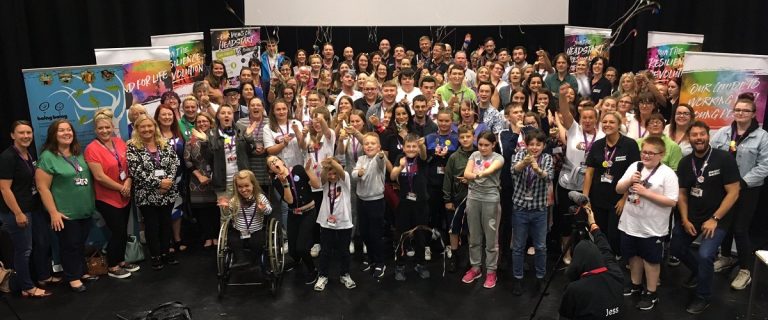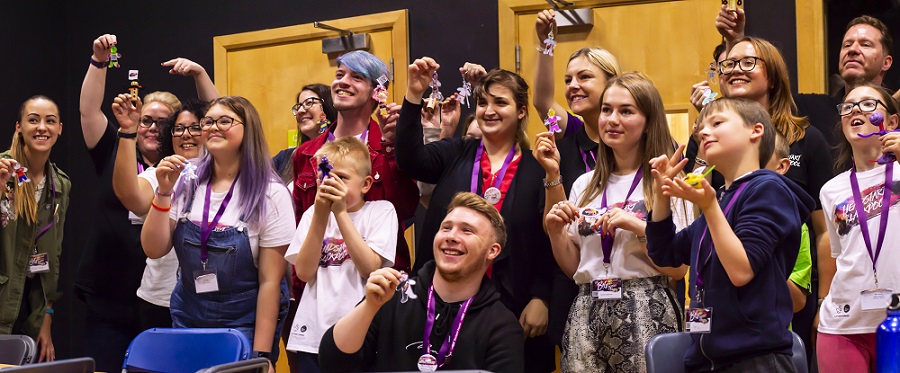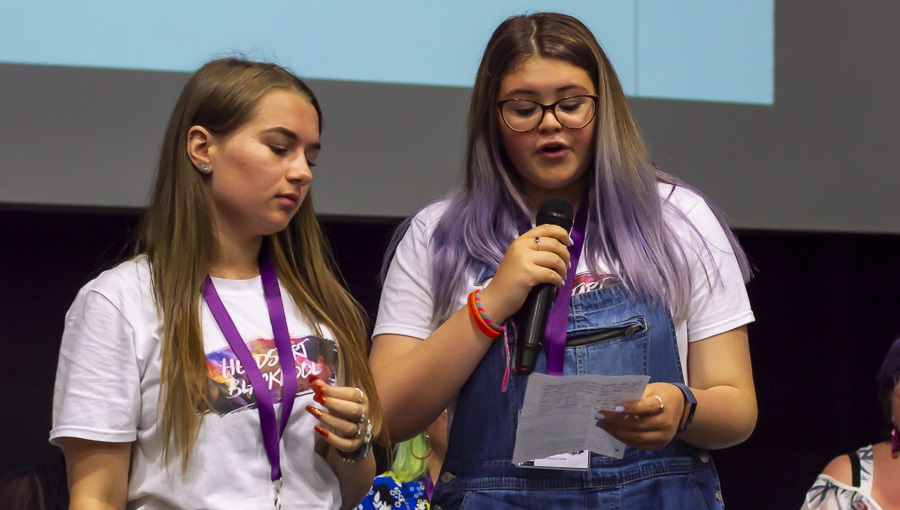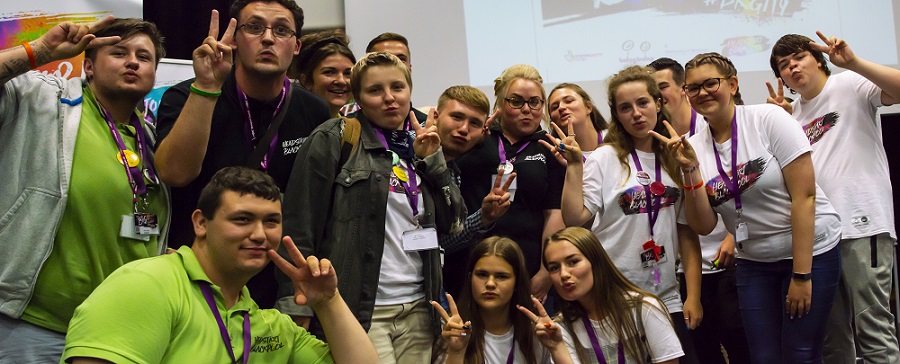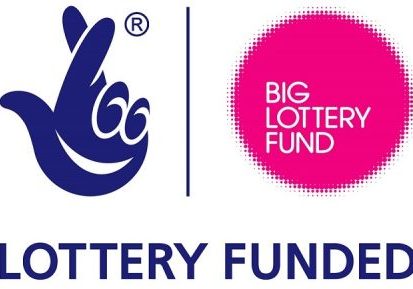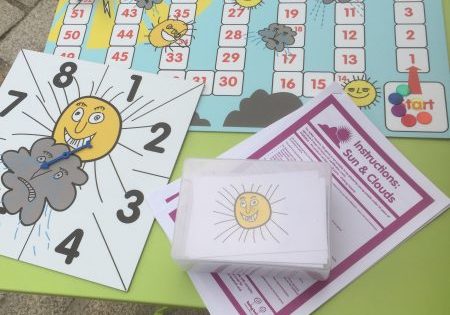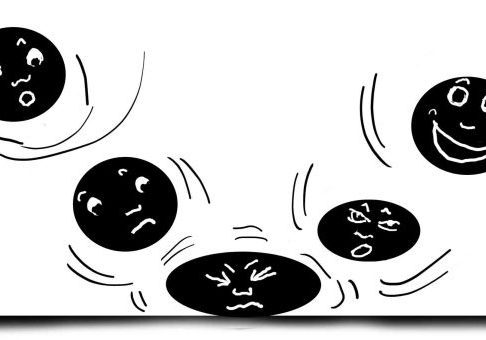Boingboing blogs from… The Big Resilience Get Together
Viva la Resilience Revolution – Reflections on the Big Resilience Get Together in Blackpool – 30 July-1 August 2019
Collectively written by everybody present, but especially Lynne, Teresa Smith, Kaden Sheward, Hannah Eaglestone, Bethany Clarke-Povey, Chanotte, anonymous assistant educational psychologist, Hannah, Kirsty, Jordan Wood, Angelica, Andrew Speight, Angel Farsytn, Ethan, Lily, Jamie, Pauline Wigglesworth, Mirika Flegg, Sam Richardson, Joshua Kania, Joanne Donnelly, Rosie Gordon, Caroline Beswick, Chris, Buket Kara and Angie Hart
Blackpool Sixth Form College. 30 July to 1 August 2019. Off we went with the third Blackpool Headstart Learning Week, this year called the Big Resilience Get Together (BRGT). The HeadStart team, along with Boingboingers and colleagues from the University of Brighton’s Centre of Resilience for Social Justice, children and young people, parents and carers, teachers, practitioners, and commissioners, got together to share, learn and improve the wide range of work undertaken by the HeadStart team this year in the Resilience Revolution to ‘beat the odds whilst also changing the odds’.
This year’s BRGT was full of inspiring keynote speeches and informative workshops, all were well organised and structured. It brought people from a wide range of ages (11 to 70 years), occupations, lived experiences, and cities, together in a welcoming and inclusive environment. Judy, for instance, a school mental health advisor from East Sussex, said ‘from the moment I arrived, I experienced a very strong, ‘together’ community, committed to making a real change at all levels of local institutions’.
This three-day event blew away the minds of the adults attending – could young people be any more inspirational than the ones at the BRGT? Even Lynne, an educational psychologist and also ‘an ageing cynic’, expressed how inspired she was with ‘young people’s voice in Blackpool – loud and proud’. For Teresa Smith (age 46), the BRGT ‘has been an eye-opening experience to see just how many people are fighting for the Resilience Revolution and the support and passion around helping young people who are our Future.’
Each day of the BRGT brought keynote speeches followed by parallel workshops focusing on a specific theme: Schools, ‘Our Children’ (Looked After Children), and Mental Health. Each day was full of ice-breaking games and activities such as real-life guess who (incorporating a social justice perspective), Jenga, human bingo, whisper challenge, taste tests, distraction boxes, and so on, all co-delivered by young people and adults in the spirit of co-production.
We ended each day with a brilliant reverse Q and A panel, where a committee of young people, namely Hannah Eaglestone, Ellie Toth, and Corey Dobb, alongside young professionals including Joshua Kania, Ollie Gibbs, and Patrick Valentine, asked questions to the audience about the issues raised during the day. Reverse panels overturned the power structure where adults were in the position to ‘answer’ to the young people, sometimes to admit their previous shortcomings, but also to take the initiative to build a better future.
It’s reverse panel time again!
Q1: what do you think are the biggest challenges that Our Children face & how can you combat these in your work? pic.twitter.com/ZaFICxbf72
— Resilience Revolution (@ResilienceRev) July 31, 2019
Even lunch breaks were informative and full of activities. We had the launch of the Resilience Revolution Manifesto, as well as highlights from a new publication coming soon from Boingboing, Blackpool HeadStart, and the Centre of Resilience for Social Justice, Supporting children and young people’s mental health: A guide for schools using a resilience based approach. We had the chance to visit the booths of different projects and initiatives; we had badge making, resilience rocks painting, resilience tower playing, fresh air and exercise. We were also provided with Our Guide to Working with Young People co-produced by Highfurlong Special School’s Resilience Committee that consist of young people of varying ages and disabilities.
Day 3 #BRGT19 highlighted the newly launched #ResilienceRevolution Manifesto, asking individuals & orgs to commit to taking action as part of our social movement. We made a great start ???? but if your names not down & you want it to be, get in touch! We ref you too @equalitytrust! pic.twitter.com/7KzimdxZ4B
— Resilience Revolution (@ResilienceRev) August 8, 2019
Today at the #BRGT19 we have a schools focus & one of the things we are SO EXCITED to launch is the #coproduced #MentalHealth ‘Guide for Schools Using a #Resilience Approach’. Come take a look! #ResilienceRevolution @bb_resilience @uniofbrighton @BpoolCouncil @TNLComFund pic.twitter.com/mURqIprIMM
— Resilience Revolution (@ResilienceRev) July 30, 2019
It’s lunchtime here at #BRGT19…as well enjoying a delicious lunch prepared by Nibbles cafe (Blackpool Independent Living Centre) we have badge making, resilience rocks painting & resilience tower playing! Loads of #ResilientMoves on offer! #ResilienceRevolution pic.twitter.com/zbx95pf6ji
— Resilience Revolution (@ResilienceRev) July 31, 2019
Day 1 was kicked off with a short but delightful concert by the Brass Band of the Park Community Academy. The first keynote speech was from Neil Humphrey, professor at the University of Manchester’s Institute of Education, on the role of schools in promoting mental health. His speech was followed by a response from Kaden Sheward, a member of the Young People’s Executive Group (YPEG). Kaden highlighted how joining a school-based initiative as a part of the HeadStart programme, that included co-production activities, increased his sense of belonging and enabled him to have a voice and improved his mental health and resilience.
Kaden, a #youngperson from the #ResilienceRevolution is now responding to @neilhumphreyUoM #BRGT19 keynote speech. Kaden highlights the role of coproduction in his own journey & urges people to be honest about what opportunities they are providing #youngpeople pic.twitter.com/6urUkDvrCj
— Resilience Revolution (@ResilienceRev) July 30, 2019
After the first keynote speech and the response, participants were splintered to the workshops on school-based activities and programmes: Peer mentoring – St Mary’s Heroes; Wellbeing Measurement Framework findings – What does it mean for Blackpool schools; and the Academic Resilience Approach. Though we must admit, all the topics were fascinating, and for many, it was difficult to choose.
The afternoon session was kicked off with a fantastic keynote speech from Hannah Eaglestone and Bethany Clarke-Povey, members of YPEG, about the role of Resilience Committees in schools in changing the odds: ’Here in Blackpool we are working towards creating a whole town approach to building a better Blackpool. A more resilient place in which we are able to live, grow up and thrive in! Here in sunny Blackpool, we value our fundamentals, which help us keep our work in keeping with Resilient Therapy, the evidence-based approach which underpins the Resilience Revolution. Personally, I believe the Resilience Committees are such a good vehicle to carry out these fundamentals.’ These fundamentals included asset-based approaches from a social justice lens with co-production.
“Power to the Pupils”
Hannah & Bethany are giving our 2nd keynote speech, rooting the title of their presentation in the #UNCRC @UN & why this matters for #Blackpool & the #ResilienceRevolution pic.twitter.com/crq6mG5fy1
— Resilience Revolution (@ResilienceRev) July 30, 2019
Following their speech, workshops were implemented focusing on School-based Pupil Run Resilience Committees, Art Therapy, and Resilience in Transition. We finished with a reverse panel, where young people opened discussion on how to reduce school exclusion, how to improve the sense of community in Blackpool, and why should people value children’s and young people’s voices. The consensus endorsed the aspiration for Blackpool to be a no school exclusion town and the critical role of young people in this transformation.
At the end of the day, participants were inspired by the programme, as well as the part young people played in delivering it. Chanotte, an assistant educational psychologist, enthused: ’Today has been provoking and is certainly the start of many conversations to be had in my schools. The emphasis on co-production and empowering young people to be involved in driving their generation’s futures forward is the key take-home message. Too often are young people overlooked and decisions made for them – I feel encouraged to hear that this is now changing and may soon be a thing of the past.’ In that line, we would also agree with another (anonymous) assistant educational psychologist that, ‘people will carry the greatness and potential of co-production and resilience with them throughout their career’. Other adults stressed the involvement of schools in the Resilience Revolution such as Hannah (age 35) calling ‘more schools to attend these Resilience Get Togethers, so they are fully aware of this movement’, while others also regarded individual responsibility, as Kirsty (age 28) pointed out ‘we all have a part to play, however young or old, to spread the inspiration of resilience’. Jordan Wood, a youth engagement worker, highlighted the importance of giving a voice to young people because ‘if you are going to build a future for young people, then the young people should be the foundations of it’. But the day was also inspiring and influential for young people. Angelica (age 14) stated that ‘as a young person, she feels her voice can be heard’. Andrew Speight, MYP (age 16), called for ‘Power to the pupils! Campaigns must be launched to promote educational co-production and bring about student democracy.’
The second day, ‘Our Children’ (a term used by Blackpool instead of Looked After Children) started with a keynote speech from Martin Lennon, Head of Public Affairs of the Children’s Commissioner Office. In his talk, Mr Lennon focused on the young people who are at greater risk for school exclusion and how poverty, mental health difficulties and educational attainment are linked to each other. In response, Ellie Toth, the Chair of YPEG, very passionately highlighted inequalities and stereotypes that young people growing up in the North experience, and the importance of tackling inequality here and now.
These are the young people the @ChildrensComm are most worried about, not just here in Blackpool but across the country. We need to look at why the system is failing these young people. Every young person deserves an education. It’s their right! #ResilienceRevolution #BRGT19 pic.twitter.com/T9f30CHjDt
— Resilience Revolution (@ResilienceRev) July 31, 2019
After Ellie’s powerful response, participants dispersed for the parallel workshop sessions. The first workshop explored a co-produced model of practice for social work. The second workshop was on the Back on Track project, in which the resilience coaches aim to keep Looked After Children in mainstream education when appropriate. The third workshop focused on developing and shaping next year’s National HeadStart Conference.
The second keynote speech of the day was delivered by Claire Walsh, the Lead on the Friend for Life project, and Mirika Flegg, a HeadStart PhD student, focusing on smashing the statistics and changing the odds for Our Children based on the Friend for Life project. Friend for Life is an exciting project putting into practice Angie Hart’s original idea of enabling every child failed by social, health and educational systems to have a friend for life. Special guests, Friend-for-Lifers Tyler and Steph, also took part in the keynote.
“you’ve got a friend in me”
Incredible input & song from Tyler & Steph who shared some insights from their friendship via the ‘Friend for Life’ project https://t.co/WrVIQhPb7G
They got a standing ovation here at #BRGT19 #ResilienceRevolution pic.twitter.com/9Pso18v1l3
— Resilience Revolution (@ResilienceRev) July 31, 2019
Or this one:
Mirika & Claire are delivering our 2nd keynote speech focusing on #changingtheodds for Our Children (a term we use in #Blackpool when referring to children who are looked after….or we prefer to just use their name!)#BRGT19 #ResilienceRevolution pic.twitter.com/lsGbospGnB
— Resilience Revolution (@ResilienceRev) July 31, 2019
Following this powerful, inspiring and fun speech, three parallel workshops began on: the War of Words, a challenge by young people to adults to ‘stop using social work language’ as ‘it makes us feel we aren’t people’; Special Guardianship; and the co-produced Friend for Life Game. At the end of the day, the reverse panel asked the participants to share their opinions on the challenges that Our Children face and how to combat these challenges, the roles that young people should have at the conference, and how the participants plan to increase co-production in their project or service.
At the end of the day, the Friend for Life project was one of the highlights. Craig, a young engagement worker, described it as ‘a revolutionary project where the choices are child centred’, and ‘an amazing concept put with action by a fabulous group of people’. Indeed, Angel Farsytn (age 26) wished to ‘have it in Hull!’. Young people, such as Ethan (age 11), Lily (age 11) and Jamie (age 13), pointed out that they very much enjoyed the Friend for Life Game, making friends. Angie Hart from the CRSJ and Boingboing said, ‘I nearly had to be carried out on a stretcher I was so emotional listening to the speeches today. It has been so moving and really incredible to see how Blackpool young people have developed their skills. Let’s hope adults working in powerful systems can match their commitment, skill level and enthusiasm. If they did, the inequalities that Blackpool experience would soon be in the past.‘
Another rising star of the day was Ellie and how she smashed her response to the keynote speech. Pauline Wigglesworth, HeadStart Programme Lead, expressed that she was ‘so utterly impressed by Ellie’s response’ as it was an ‘informed, passionate and heartfelt speech about her hopes and vision for a more inclusive society’. Mirika Flegg, a PhD student with HeadStart, asked to ‘publish Ellie’s speech in full in a blog’.
Now Ellie, Chair of YPEG is responding to Neil’s keynote & giving a very passionate response highlighting the North / South divide & our need to tackle inequalities here & now! Very important messages for us all to hear @educationgovuk @ChildrensComm @TNLComFund #BRGT19 pic.twitter.com/L3syoL8Fzt
— Resilience Revolution (@ResilienceRev) July 31, 2019
The last day of the BRGT 2019 focused on Mental Health. After ice-breaking games on the Resilient Moves from the Resilience Framework, the first keynote speech was delivered by Pauline Wigglesworth and Laura Zakubinska from the HeadStart team, and members of YPEG from the Resilience Revolution. Prof Angie Hart responded to this speech, asking the participants what they are going to do to support this revolution. Following this inspiring session, workshops commenced on Humber Talent Match Supported Employment, the Walk and Talk project, and Revolution Researchers’ fascinating work to date, where again young people excelled during the presentations ably supported by Dr Josh Cameron from the CRSJ and other adults.
Laura & Pauline are delivering our first keynote this morning. Highlighting the #ResilienceRevolution is a social movement which anyone living, volunteering or working in #Blackpool can be a part of. Let’s stand together & make change happen #BRGT19 ???? pic.twitter.com/sHMDL6fzsW
— Resilience Revolution (@ResilienceRev) August 1, 2019
The last keynote speech was from Karen Sweet, HeadStart Project Officer, and the Resilience Pathway Group where they shared the very inspiring, but also challenging, story behind the Resilience Pathway, as well as the importance of it.
We are so proud of the #ResiliencePathway…check out our short video that tells you how we made it happen #BRGT19 #ResilienceRevolution https://t.co/Cx5bZ1Bq6M
— Resilience Revolution (@ResilienceRev) August 1, 2019
The following workshops focused on Story-Led Resilient Therapy with the collaboration of the Grand Theatre, Classrooms that communicate, and on the different value that our work creates through the lens of the Value Creation Framework (e.g., immediate value, potential value, applied value, realised value, and transformative/revolutionary value). During the reverse panel, young people asked why it is important that young people know about what services and support are available to them, what the participants can do to promote a community approach alongside a medical approach to mental health, and the question raised by Hannah on the first day of her keynote speech, ‘Why should we allow oppressive systems and policies and a lack of government funding to have the ability to hold us back and tell us what we deserve and who we can or cannot be?’ Finally, Sam Richardson, a member of the HeadStart team, shared a powerful poem for calling people to the Resilience Revolution.
And finally….Sam, #Blackpool born & a core member of the #ResilienceRevolution shares a powerful poem to take us forward… #BRGT19 pic.twitter.com/DsFGqFwySy
— Resilience Revolution (@ResilienceRev) August 1, 2019
At the end of the BRGT, the take-home message was the importance of co-production and young people’s voice. For Joshua Kania (age 20) ‘co-production is the key to success’, while Joanne Donnelly called out to ‘spread the word!’ for co-production as ‘there are many more young people that don’t live in Blackpool out there!’ Young people were happy to be involved in co-production as well. Kaden, a co-producer of the BRGT, stated that, ‘I have enjoyed experiencing the workshops and helping those who need my help.’ Rosie Gordon, a PhD student in HeadStart, expressed that, ‘hearing young people speak so passionately and proudly of their town was inspirational for us all’ and ‘we could learn from their example.’ Similarly, Caroline Beswick from Boingboing highlighted that we should ‘trust young people to lead and give them a platform to be heard. They have shared loads of ideas and solutions to some of our current complex challenges.’
The BRGT 2019 showed us how far the Resilience Revolution has progressed in the last three years, and how Blackpool’s young people have started to create their own potentially powerful legacy. With their energy and enthusiasm, young people often outshone adult speakers in their keynote speeches and responses. Pauline Wigglesworth remarked on this progress as: “What a difference from last year! It has been truly inspiring to see young people passionately talking about change for our town. Fantastic! I will spend the next 12 months working hard to convince all members of the Resilience Revolution that we really are a world’s first!”
Our thanks to all those who organised, collaborated and participated in this extraordinary event. We hope to see them all again next year for our International Resilience Conference and we’re hoping to see you too. If you’d like to submit a contribution yourself please take a look at the conference themes and online submissions process. Let’s end with a very important demand from a young person, Chris (age 13): ‘Keep the revolution alive.’
It’s a wrap! #BRGT19 #ResilienceRevolution
See you in September 2020! https://t.co/mDB2cMyZ4L pic.twitter.com/6UcbkYJi0g
— Resilience Revolution (@ResilienceRev) August 1, 2019
Co-authored by everybody present and especially Lynne, Teresa Smith, Kaden Sheward, Hannah Eaglestone, Bethany Clarke-Povey, Chanotte, anonymous assistant educational psychologist, Hannah, Kirsty, Jordan Wood, Angelica, Andrew Speight, Angel Farsytn, Ethan, Lily, Jamie, Pauline Wigglesworth, Mirika Flegg, Sam Richardson, Joshua Kania, Joanne Donnelly, Rosie Gordon, Caroline Beswick, Chris, Buket Kara and Angie Hart.
